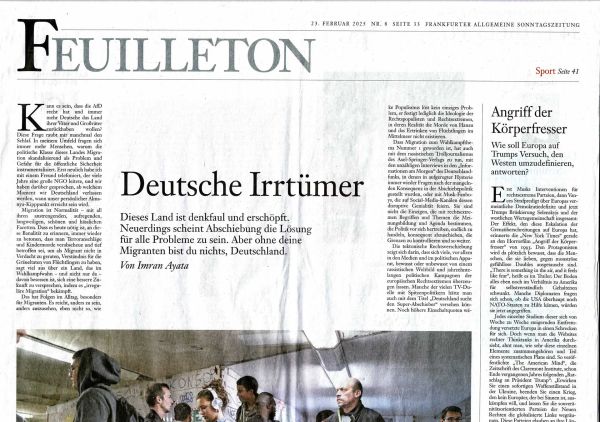Germany Made a Mistake?
Germany Made a Mistake?
This article "Deutsche Irrtümer" (Germany's mistakes) appeared in the Sunday edition of the Frankfurter Allgemeine newspaper on the 24th of February. The Frankfurter Allgemeine apparently allowed a guest-author to publish an editorial on the first page of its "Feuilleton" section, where German newspapers typically publicize cultural events and explore public curiosities. Ayata does not work for the newspaper. He is an ethnic Turk born in Germany who runs a travel agency in Berlin and writes fiction on the side. The German-language article on Wikipedia, however, does not mention a travel agency, only his writing.
In the provocative under-title, Ayata writes:
This country has become lazy in its thinking and has exhausted its creativity. Germany believes that the solution to all its problems is to keep out immigrants. But without your immigrants, you are nothing, Germany!
With confrontational language like that, Ayata will not likely win lots of believers among German-speakers. Stands to reason, most of the readers who agree with him will be the immigrants themselves. I believe that Ayata did immigrants a disservice by postulating that the future of Germany depends on its allowing more immigrants. Ayata's superior or arrogant stance flies in the face of reality, namely that Germany has more immigrants than it can handle, now. He says nothing about Germany's herculean humanitarianism. The only real mistake in Germany's effort was to allow entry to so many immigrants, overtaxing local governments, local school districts, and the other institutions that help assimilate immigrants of other cultures, religions, and languages.
Most Germans believe that the immigration problem does not result from inter-ethnic conflict, nor from military conflict, but from overpopulation in the Third World, the subsequent depletion of its natural resources, and the degradation of its physical environment. That the immigrants could do the same number on Germany worries a lot of voters. Not surprisingly, the anti-immigrant political party the Alternative for Germany (AfD) scored second-highest in the most recent election.
In the first paragraph of his article, Ayata complains:
Why does the political class of Germany believe that scandalizing its immigrants, to turn the public against them, will resolve Germany's problems and reduce the dangers that it faces?
Again, the presumptuousness of his question flies in the face of reality. Terrorist actions committed by immigrants have increased in the last year. Two acts of terrorism occurred during my last visit, in February. I will describe the attacks for my American readers:
- September 5, 2024, Emrah Ibrahimovic, whose Muslim parents emigrated from Bosnia-Herzegovina, tried to murder Israeli Consulate officials near the Karolinenplatz in Munich.
- February 13, 2025 Farhad Noori, a young Afghan male drove a car into a crowd of people in Munich, killing two and injuring 30.
- January 22, 2025, Enamullah O______, a young Afghan male attacked a group of pre-school children in Aschaffenburg, killing one and a worker.
- December 20, 2024, a Saudi national rammed his car into a Christmas market crowd in Magdeburg, killing 30 and wounding 300.
- December 4, 2024, an Iraqi national was arrested for planning an attack on a Christmas market in Augsburg.
- November 20, 2024, a 17-year-old of Turkish origin was arrested for planning an attack on a Christmas market in Elmshorn. He planned to drive a truck into a crowd.
- September 13, 2024, a Syrian immigrant was arrested for planning an attack on a military unit in Hof, to "kill as many of them as possible".
So far, Germans have responded to the dangers posed by the immigrants in the only civilized way they know, by voting. How long they continue a passive resistance to terrorism depends a lot on the actions of Germany's politicians.



